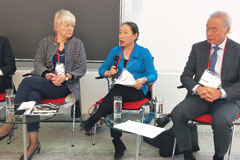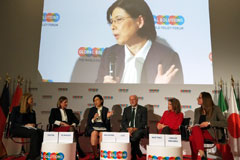Entering the Final Phase of T20 Policy Recommendations: JICA-RI Participates in the Global Solutions Summit
2019.04.26
The Global Solutions Summit (GSS) was held in Berlin on March 18 and 19, 2019. The GSS is an annual summit hosted by Kiel Institute's Global Solutions Initiative (GSI) to discuss global issues from multiple perspectives toward the finalization of the Think20 (T20) policy recommendations for the G20.
This year approximately 1,600 people from 120 countries attended the GSS. GSI President Dennis Snower opened the summit, noting that while the economy globalizes at a rapid pace, the political society is seeing greater ethnic and religious divisions, and that this decoupling of the economy and political society is what causes current crises. He stressed the need for a moral narrative to direct people towards cooperation and a paradigm change, and announced "Paradigm Change to Recouple the World" as a key theme of the GSS. Ten Task Forces in different policy fields are working towards the "T20 Japan 2019" planned for May 2019. As G20 presidency, Japanese think tanks are leading the drafting work of Policy Briefs (PBs), and Task Force members presented the final draft of the PBs at the summit, and received feedback from experts around the globe.
JICA Research Institute (JICA-RI) co-chairs Task Force 1 "2030 Agenda for Sustainable Development (Sustainable Development Goals: SDGs)" and Task Force 5 "Cooperation with Africa." At this GSS, JICA-RI hosted four sessions related to Task Force 1: "Achieving Universal Health Care: Where the G20 Must Act," "Education as an Enabler for Sustainable Development," "Promoting Women's Economic Empowerment: Strengthening Measurement to Deepen Impact" and "Leveraging the Private Sector for Achieving Sustainable Development."
In the session on "Achieving Universal Health Care: Where the G20 Must Act," Sakiko Fukuda-Parr, a distinguished fellow at JICA-RI and professor at the New School, made a kick-off speech. She emphasized the need for health-related policy coherence, health as an aspect of human rights, and the need for public financing to address increasing health costs and reduce health inequity. Gabriel Leung, chair/member of the T20 UHC Working Group and the Dean of Medicine at the University of Hong Kong, and Yasushi Katsuma, a professor at Waseda University introduced PBs, after which they held a panel discussion on priority UHC issues for the G20 with Tachi Yamada, a leader in the private sector who has worked in the pharmaceutical industry and the Bill & Melinda Gates Foundation. Some topics discussed were the gap between the focus of market-based pharmaceutical development and needs in developing countries, the difficulty of access to the medicine due to expensive drug costs caused by intellectual property protection, and promoting transparency of international cooperation by non-members of the OECD Development Assistance Committee (DAC).

Sakiko Fukuda-Parr, a distinguished fellow at JICA-RI (center), speaks at the session on universal health care
In the session on "Education as an Enabler for Sustainable Development," Nobuko Kayashima, a principal research fellow at JICA-RI, introduced recommendations in the PB organized by JICA-RI. Barbara Ischinger, former OECD Director for Education and Skills, said Millennium Development Goals (MDGs) focus on the "quantity" of education while SDGs focus on the "quality" of education. There were also discussions on the impact of socioemotional skills on problems like bullying and social withdrawal, the relationship between education and gender issues, early childhood care and education, and school education evaluation systems.

Nobuko Kayashima, a principal research fellow at JICA-RI (third from left), speaks at the session on education
In the session on "Promoting Women's Economic Empowerment: Strengthening Measurement to Deepen Impact," Gala Diaz Langou from CIPPEC, an independent, policy-oriented NPO, which co-hosted T20 Argentina in 2018, introduced the PBs. Discussions were moderated by Margo Thomas, founder and CEO of Women’s Economic Imperative and associate fellow at Chatham House, and covered topics such as the need to subsume the 500 million women currently excluded from access to financial services, and the importance of correctly appraising the roles and capabilities of women by making unpaid work visible.
In the session on "Leveraging the Private Sector for Achieving Sustainable Development," Mahmoud Mohieldin, World Bank Group Senior Vice President for the 2030 Agenda, provided an overview of the progress of the SDGs and emphasized the important role of the private sector. Izumi Ohno, director of JICA-RI, introduced the PB drafted by JICA-RI and other researchers. She emphasized the need to redefine the purpose of business and explained policy recommendations on how to scale up the impact of business toward accelerating the implementation of the SDGs.

Izumi Ohno, director of JICA-RI (far-left), speaks at the closing plenary session
At the Closing Plenary session on the final day, Ohno raised the question that, while European and American countries talk about a paradigm shift, perhaps there is no need for Asian countries to undergo a paradigm shift because they have different values and traditions for finding harmony between businesses and society. In this regard, she cited Eiichi Shibusawa, a pioneering Japanese industrialist (known as the “father of Japanese capitalism”) from the Meiji era and highlighted his efforts to harmonize good ethics and business. The chairperson responded with the question, "Can Japanese style business offer solutions to the various problems?" and this kicked off a lively discussion.

事業事前評価表(地球規模課題対応国際科学技術協力(SATREPS)).国際協力機構 地球環境部 . 防災第一チーム. 1.案件名.国 名: フィリピン共和国.

事業事前評価表(地球規模課題対応国際科学技術協力(SATREPS)).国際協力機構 地球環境部 . 防災第一チーム. 1.案件名.国 名: フィリピン共和国.

事業事前評価表(地球規模課題対応国際科学技術協力(SATREPS)).国際協力機構 地球環境部 . 防災第一チーム. 1.案件名.国 名: フィリピン共和国.

事業事前評価表(地球規模課題対応国際科学技術協力(SATREPS)).国際協力機構 地球環境部 . 防災第一チーム. 1.案件名.国 名: フィリピン共和国.

事業事前評価表(地球規模課題対応国際科学技術協力(SATREPS)).国際協力機構 地球環境部 . 防災第一チーム. 1.案件名.国 名: フィリピン共和国.
scroll